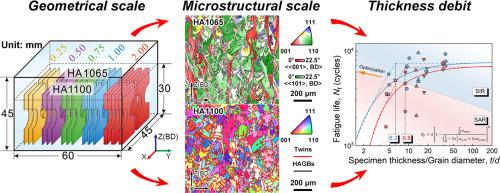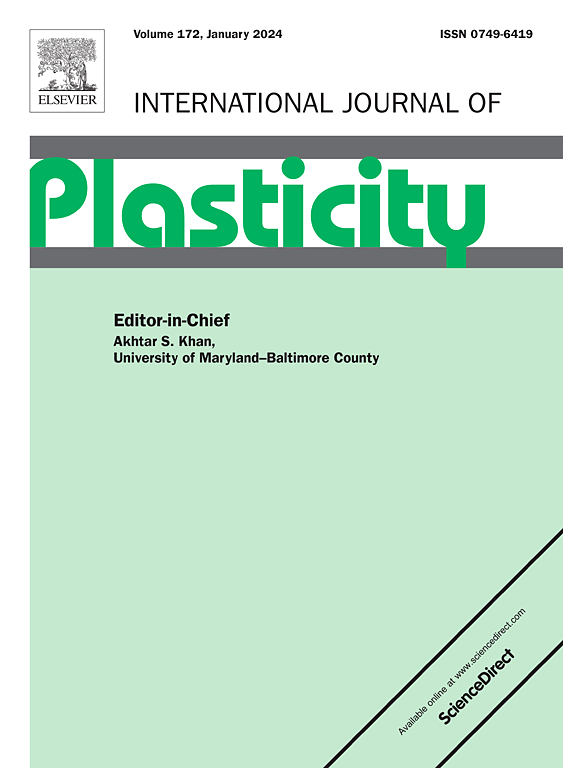Tailoring thickness debit for high-temperature fatigue resistance of Inconel 718 superalloy fabricated by laser powder bed fusion
IF 12.8
1区 材料科学
Q1 ENGINEERING, MECHANICAL
引用次数: 0
Abstract
The thickness debit often leads to uncertainty regarding the fatigue performance of laser powder bed fusion (LPBF)-fabricated Inconel 718 thin-walled components and restricts the structural design of these components. Aiming to address this issue, fatigue properties of LPBF-fabricated Inconel 718 homogenized at various temperatures were investigated at 650 °C using specimens with different thicknesses. The results reveal a pronounced influence of both the thickness debit and the intricate interplay between the microstructural and geometrical scales of the thin-walled specimens on their fatigue life at 650 °C. The fatigue life of the thin-walled specimens with the same microstructural scale reduces with decreasing the ratio (t/d) of the specimen thickness (t) to the grain length (d). The coupling effect is described by a mechanism model correlated with the geometrical and microstructural scales of the specimens, in which continuous damage mechanics (CDM) and calculation of the yield strength have been considered. Based on the model, a criterion of t/d > 6.2 for the LPBF-fabricated Inconel 718 specimens homogenized at 1100 °C, and t/d > 8.8 for those homogenized at 1065 °C are proven to be satisfied to ensure a longer and more stable fatigue life of the thin-walled specimens serving at 650 °C. Elevating the homogenization temperature from 1065 °C to 1100 °C results in an extension of the fatigue life for specimens of the same thickness. This enhancement is attributed to the improved ability of grains to coordinate local deformation, as well as the reduced prevalence of elongated Laves and other phases, which typically serve as preferential sites for crack initiation and propagation. The finding suggests that the thickness debit in high-temperature fatigue resistance of LPBF-fabricated components can be minimized by tailoring the heat treatment strategy.

利用激光粉末床熔融技术制造的 Inconel 718 超合金的高温抗疲劳性的厚度调试碎片
厚度差异经常导致激光粉末床熔化(LPBF)制造的 Inconel 718 薄壁部件的疲劳性能不确定,并限制了这些部件的结构设计。为了解决这个问题,研究人员使用不同厚度的试样,在 650 °C 下研究了不同温度下均质的 LPBF 制成的 Inconel 718 的疲劳性能。结果表明,薄壁试样的厚度差异以及微观结构和几何尺度之间错综复杂的相互作用对其在 650 °C 下的疲劳寿命有明显影响。具有相同微观结构尺度的薄壁试样的疲劳寿命随着试样厚度(t)与晶粒长度(d)之比(t/d)的减小而降低。耦合效应由一个与试样几何和微观结构尺度相关的机理模型来描述,其中考虑了连续损伤力学(CDM)和屈服强度计算。根据该模型,在 1100 ℃ 下均质的 LPBF 制成的 Inconel 718 试样的 t/d > 标准为 6.2,而在 1065 ℃ 下均质的试样的 t/d > 标准为 8.8。将均质温度从 1065 °C 提高到 1100 °C,可延长相同厚度试样的疲劳寿命。这种延长归因于晶粒协调局部变形的能力提高,以及拉长的 Laves 和其他相的减少,这些相通常是裂纹产生和扩展的首选部位。这一研究结果表明,通过调整热处理策略,可以最大限度地减少 LPBF 制成部件高温抗疲劳性能的厚度差异。
本文章由计算机程序翻译,如有差异,请以英文原文为准。
求助全文
约1分钟内获得全文
求助全文
来源期刊

International Journal of Plasticity
工程技术-材料科学:综合
CiteScore
15.30
自引率
26.50%
发文量
256
审稿时长
46 days
期刊介绍:
International Journal of Plasticity aims to present original research encompassing all facets of plastic deformation, damage, and fracture behavior in both isotropic and anisotropic solids. This includes exploring the thermodynamics of plasticity and fracture, continuum theory, and macroscopic as well as microscopic phenomena.
Topics of interest span the plastic behavior of single crystals and polycrystalline metals, ceramics, rocks, soils, composites, nanocrystalline and microelectronics materials, shape memory alloys, ferroelectric ceramics, thin films, and polymers. Additionally, the journal covers plasticity aspects of failure and fracture mechanics. Contributions involving significant experimental, numerical, or theoretical advancements that enhance the understanding of the plastic behavior of solids are particularly valued. Papers addressing the modeling of finite nonlinear elastic deformation, bearing similarities to the modeling of plastic deformation, are also welcomed.
 求助内容:
求助内容: 应助结果提醒方式:
应助结果提醒方式:


